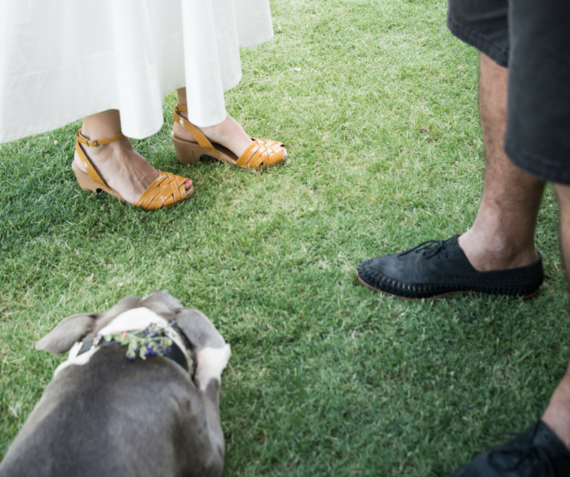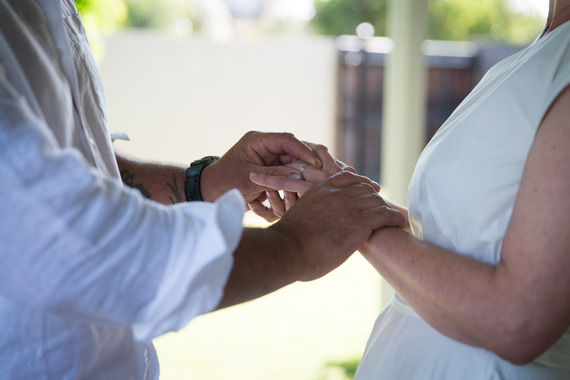Photos by Irungu Art Photography.
First published on Bridechilla Club.
Before and After
Last week in Part 1 we touched on how modern elopements, when you personalize the 'when and where' and embrace the wonderful and unique couple that you are, can be a freeing and fun alternative to a traditional wedding.
But it does lead us to the stickier topic; how on earth do we go about it? The logistics of the ceremony itself are a piece of cake, next to the potential for hurt feelings, regret and guilt that can accompany the aftermath of an elopement.
For example, what are you going to tell your friends and family before you elope -- are you going to lie to them? How are they going to feel about that? How do you plan to announce the news after you're married, so as not to alienate the people that you care about? Yikes!
Okay.
So first up, who do you tell and when?
With a traditional elopement, the idea is that you tell no-one until the deed is done (so to speak). And while not having to play favorites, by picking some family or close friends to confide in before others, sounds like a clean and easy way to go about it, the end result can be very messy indeed.
Here's the problem: it is quite common for family and close friends of a couple to have (usually unspoken) expectations about their wedding celebrations. Sometimes these expectations are formed during the development of your relationship ("I can't wait to see you get married -- you two are made for each other") or after you become engaged ("I'm so looking forward to your wedding!") or even when you were born ("you'll make a wonderful husband/wife one day"). The people who are closest to you are likely to have some preconceived ideas about how they are going to be involved with and celebrate your impending nuptials.
Now clearly, these expectations are something that you can't do very much about. And while I'm all for calling out 'problem ownership', you can certainly be mindful that these potential emotional hurdles exist and be a little sensitive to them in your elopement planning. For your own sake and that of your soon-to-be husband or wife, it's smart to start your marriage on a happy footing with those you care about.
The most obvious people to let in on your plans are your parents and/or grandparents (if you're lucky enough to still have them around). It is a courtesy and respect thing. Letting them know in advance allows them some time and space to accept your decision and come to terms with it before being expected to put on a brave face in public and explain it to the neighbours.
The next people to think about are your closest friends. Here's a few questions to consider when you're trying to decide if it's appropriate to give them a 'heads up';
- were you included in their wedding?
- did you plan to have them in your bridal party?
- if you were heading out dress/suit shopping, would you expect that they'd be there?
Here's something else to keep in mind; although it can be smart to be prepared to explain to your immediate family and friends why you want to elope, don't feel like you need to justify your decision.
The next people to check-in with are your fiancé and yourself.
Some couples who elope are surprised to find themselves experiencing pangs of guilt, regret or feeling like they have somehow 'missed out' before and/or afterwards. Keeping the lines of communication open with your fiancé and expressing your needs to each other is crucial. It is also important to mark the occasion for yourselves now and for the future. Organizing for photos or video to be taken, or marking the moment with a special song, dance or dinner will all help to make your experience a memorable one that you can easily reminisce about and look back fondly on for years to come.
After
It is safe to assume that some of your friends and family will not be as elated as you are when they receive your big news. And, depending on your communication style and relationships, you may need to prepare yourself for some strong reactions. There is a possibility that some people will respond negatively and conservative friends and family may not support your decision or feel disappointed about being left out.
Which is the main reason why the way that you announce your elopement is important. For close family and friends, I would recommend to speak with them in person. In this situation, a hand-written note or phone call will always be streets ahead of a group email or social media post. Sometimes it can help to have your announcement printed and ready to go ahead of time, so when you get home they can be distributed immediately and no one feels like they were the last ones to know.
To post-party or not to post-party?
Post-wedding celebrations can be a lovely way to rally your nearest and dearest and to recognize the significance of your marriage and newly-wed status. It can be as simple as a shared meal or as grand as a bells-and-whistles reception. Again, it all depends on what feels right for you.
And finally, just because you're eloping, doesn't mean that your wedding is not special or doesn't deserve to be honored. Be excited, celebrate wholeheartedly, indulge yourself and each other and revel in the experience. You're only doing this once, right?
Join the community at Bridechilla Club

